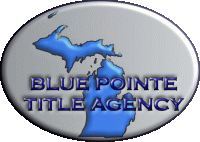What is Commercial Due Diligence?
- Blue Pointe Title
- Feb 16, 2024
- 3 min read
Updated: Oct 15, 2025

Simply stated, the goal of commercial due diligence is to reduce the risk of post-transaction surprises. This can pertain to both the success of the property itself and the market it is in, as well as your rights to use it.
Just as an investor will do their due diligence before making an offer on a property, the title company will do theirs to ensure it is a smooth, safe transition.
Let’s take a closer look at how commercial due diligence works to reduce the risks involved with this type of property purchase.
The Risks Associated with Commercial Property
Commercial real estate transactions can be complicated. Not only do they involve several different investors, both individuals and companies, but they also often include the transfer of high dollar amounts. Therefore, reducing risk is a must, such as:
Knowing whether or not the seller has the right to sell the property.
Finding easements or encroachments that can interfere with the use of the property.
Uncovering current litigation involving the property or prior lawsuits or bankruptcies that may interfere with your rights.
Addressing judgments, liens, and outstanding taxes.
This is just a sampling of the many things that can affect a commercial real estate transaction. If they are not addressed or discovered before the closing, it could cause a catastrophic financial loss down the road.
Types of Due Diligence
There are many different types of commercial due diligence that investors use. Many even create a checklist to determine whether the property is worth buying — and any potential risks that may be involved with doing so.
Financial Due Diligence
Financial due diligence is taking a look at the property, any current tenants, the market, and financing trends to determine if it is a sound investment. This involves looking into the current owner’s financial data from the last few years concerning the property.
Physical Due Diligence
Physical due diligence means taking the time to inspect the structure itself, as well as the land and the area around it. Enlisting the help of appraisers and inspectors can help you get a clearer picture of the health - and ultimately worth - of the property. This type of commercial due diligence should also mean taking a closer look at zoning regulations by contacting the planning department.
Legal Due Diligence
Legal due diligence involves a close examination of the title, making sure it is free and clear of any defects. It also addresses easements, rights-of-way, restrictions, covenants, and more that may impede your ability to have full rights to the property.
The Importance of Commercial Due Diligence
When it comes to your transaction, you want to feel confident that once your real estate purchase has been finalized — you are free to move forward without any issues. With the intricacies of commercial property transactions, the careful eye of commercial due diligence is a must-have. After all, each time the property you are buying has changed hands, it has come with the same complexities.
Title companies perform an in-depth title search to make sure that the seller is the legal owner and that there are no issues affecting the title. This is all done so that a title insurance policy can be issued.
Why title insurance?
Paying a one-time premium fee at closing will ensure that you are protected from anything that may have been missed or did not show up despite the high level of due diligence as it applies to your title rights.
Having a title insurance policy in place for your commercial property reflects just how important due diligence is for a successful investment, both now and in the future.
Protect Your Commercial Property with Title Insurance
At Blue Pointe Title, we understand the risks that you are taking when purchasing commercial real estate. Our team of title experts works hard to perform the commercial due diligence that will allow you to have a hassle-free transaction – and move forward with the protection of title insurance.
Contact us today to get started.






Comments